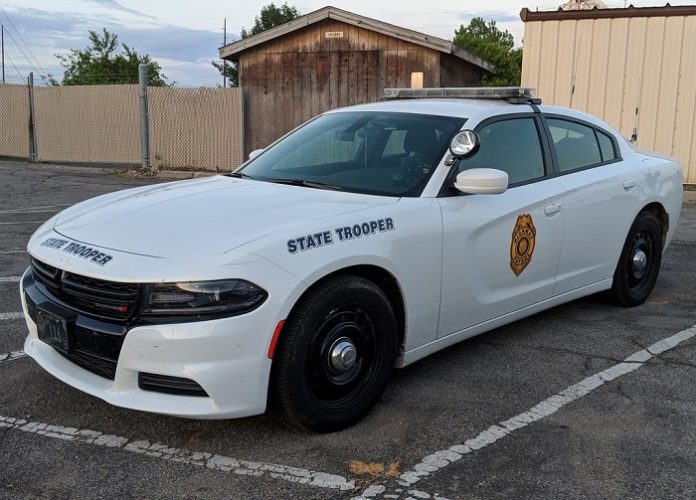The Kansas Highway Patrol is asking a federal judge to delay an injunction that would bring the agency under court oversight and ban troopers from using a technique called the “Kansas two step” to detain drivers and search for drugs.
The Highway Patrol is requesting the delay while it appeals a federal court ruling that found the Kansas two step violated the Fourth Amendment rights of motorists. The KHP is appealing the ruling to the 10th U.S. Circuit Court of Appeals.
The injunction puts the Highway Patrol under court supervision for at least two years and sets out requirements for documenting investigative traffic stops and detaining drivers and requires yearly training for troopers.
Without a delay of the injunction, the Highway Patrol argues that it will suffer irreparable harm while the case proceeds on appeal.
The Highway Patrol says in its brief that the injunction imposed by U.S. District Judge Kathryn Vratil not only interferes with its ability to investigate crime but also imposes costly administrative burdens that it can’t recover.
“The injunction imposes a number of conditions on KHP troopers that even plaintiffs admit go beyond the requirements of the constitution, hamstringing KHP troopers from performing their duties as allowed by law,” the Highway Patrol said in its brief.
“And the administrative burdens the injunction places on KHP will drain resources — both staff time and money — that KHP could focus on other law enforcement priorities,” the Highway Patrol said.
“Put simply, these requirements will interfere with KHP’s ability to enforce the law. And these law enforcement activities are not limited to drug interdiction; they include a number of other priorities, such as combating human trafficking.”
The Highway Patrol says the plaintiffs who brought the lawsuit will not suffer any harm if the injunction is delayed.
The patrol said it is “highly speculative” that the plaintiffs will undergo either an “unconstitutionally coercive ‘two-step’ encounter” or a post-traffic stop detention without reasonable suspension by KHP troopers in the future.
“The likelihood of either of those occurring while this case is on appeal is even smaller,” the Highway Patrol argued.
“After all, the most recent incident involving plaintiffs occurred in 2019, and none of the plaintiffs have claimed to have had unconstitutional interactions with KHP since that time.”
The Highway Patrol noted that injunction requires troopers to obtain written consent before asking questions following the conclusion of a traffic stop.
“Plaintiffs by now are no doubt aware of their right not to answer questions.”
And in the “extremely unlikely event” that a trooper unlawfully detained one of the plaintiffs, the KHP said a lawsuit seeking damages would be more effective at addressing the harms than the injunction.
Last summer, Vratil ruled that the so-called Kansas two step violated drivers’ rights to be free from unconstitutional searches under the Fourth Amendment of the constitution.
Civil liberties advocates said troopers would use the two-step tactic to break off an initial traffic stop and attempt to reengage the driver in what would then be considered a consensual encounter and give them more time to search for drugs.
After issuing a ticket or warning and telling the driver to have a safe trip, the trooper would turn their body, take two steps toward the patrol car but return to the driver’s window to ask the driver to answer a few more questions.
The judge criticized the Highway Patrol for waging a “war” on motorists traveling on Interstate 70 through Kansas between Colorado and Missouri, two states where marijuana is now legal.
The injunction bars the Highway Patrol from using the two-step technique to extend traffic stops of motorists without reasonable suspicion or “without the motorists’ knowing, intelligent, and voluntary consent.”
The agency is barred under the injunction from giving any weight to the fact that a motorist is traveling to or from a “drug source” or “drug destination” state when developing reasonable suspicion when making a traffic stop.
The injunction requires troopers to document all investigative stops and detentions.
They also must document a driver’s consent to a search or to engage with a trooper after the conclusion of a traffic stop.
The injunction also requires that when troopers seek consent for a search, they must inform the motorists of their right to refuse and revoke consent at any time.
The driver’s consent must be documented on a written form explaining those rights.
The injunction would remain in place for as long as four years – possibly longer if the Highway Patrol doesn’t comply with the injunction.
The injunction could end sooner, but no earlier than two years from the date of the injunction if the agency can show it met the objectives of the court order.
The injunction also requires the KHP to provide all officers with at least eight hours of training on the facts and circumstances that may be considered in carrying out an investigative traffic stop.
The first eight-hour training must be made available within 60 days of the court approving a curriculum that must be developed by the Highway Patrol and submitted to the plaintiffs for approval.
The Highway Patrol says a delay of the injunction is in the public interest.
“Both the need for effective law enforcement and principles of federalism militate strongly in favor of a stay,” the KHP says.
“These concerns outweigh any speculation that the injunction might prevent a hypothetical Fourth Amendment violation during the pendency of the appeal, particularly given the availability of other remedies.”
.
















